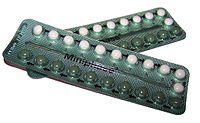
Photo from wikipedia
BackgroundDespite numerous efforts put in place to increase modern contraceptive use in Cameroon as a means to fight maternal and infant mortality, the prevalence of modern contraception has shown only… Click to show full abstract
BackgroundDespite numerous efforts put in place to increase modern contraceptive use in Cameroon as a means to fight maternal and infant mortality, the prevalence of modern contraception has shown only a slow increase and maternal mortality is constantly rising. This paper attempts to identify barriers to contraceptive use in Biyem-Assi, Yaoundé-Cameroon so as to clearly define in which domain and how to intervene concerning contraceptive use in Cameroon.MethodsIt was a community-based cross sectional study involving a two-steps cluster sampling. Data were collected from November 2014 to April 2015 and analysis done with Epi-Info version 3.5.4. Association between contraceptive use and independent factors was estimated by calculating odds ratio (OR) and confidence interval at 95%. Significance of association in univariate analysis was estimated by calculating the p value with chi2 test. Potential confounder (pregnancy intention) controlled in a multiple logistic regression.ResultsA total of 613 sexually active women were enrolled into the study with a mean age of 27.2 (δ ± 6.2) years. Among the women, 293 (47.8%) were in a union and 530 (86.8%) of them had attended at least a secondary education. Also, 107 (17.5%) responded that their beliefs do not approve contraceptive use and 101 (16.6%) said their partners do not approve contraception. At the moment of data collection, 361 (58.9 [54.9–62.8] %) were currently using a modern contraceptive method. The rate of use of modern contraception was significantly lower in women in a union (OR 0.57, p = 0.0002) and in those with age greater than 30 years (OR 0.45, p = 0.0004). Conversely, the rate of use was significantly higher in women whose partners approved contraception (OR 4.14, p = 0.0000) or when family planning was discussed within the couple (OR 1.93, p = 0.0028).ConclusionThe rate of use of modern contraception in Biyem-Assi Health District is relatively high. Women in a union and those aged greater than 30 years turn to be less likely to use a contraceptive method than the rest of the population meanwhile women whose partner approve contraceptive-use or who discuss about family planning with their partners, are most likely to use a contraceptive method than others. To increase the rate of use of modern contraception in Yaoundé-Cameroon, interventions should target more of couples and not women alone.
Journal Title: BMC Research Notes
Year Published: 2017
Link to full text (if available)
Share on Social Media: Sign Up to like & get
recommendations!